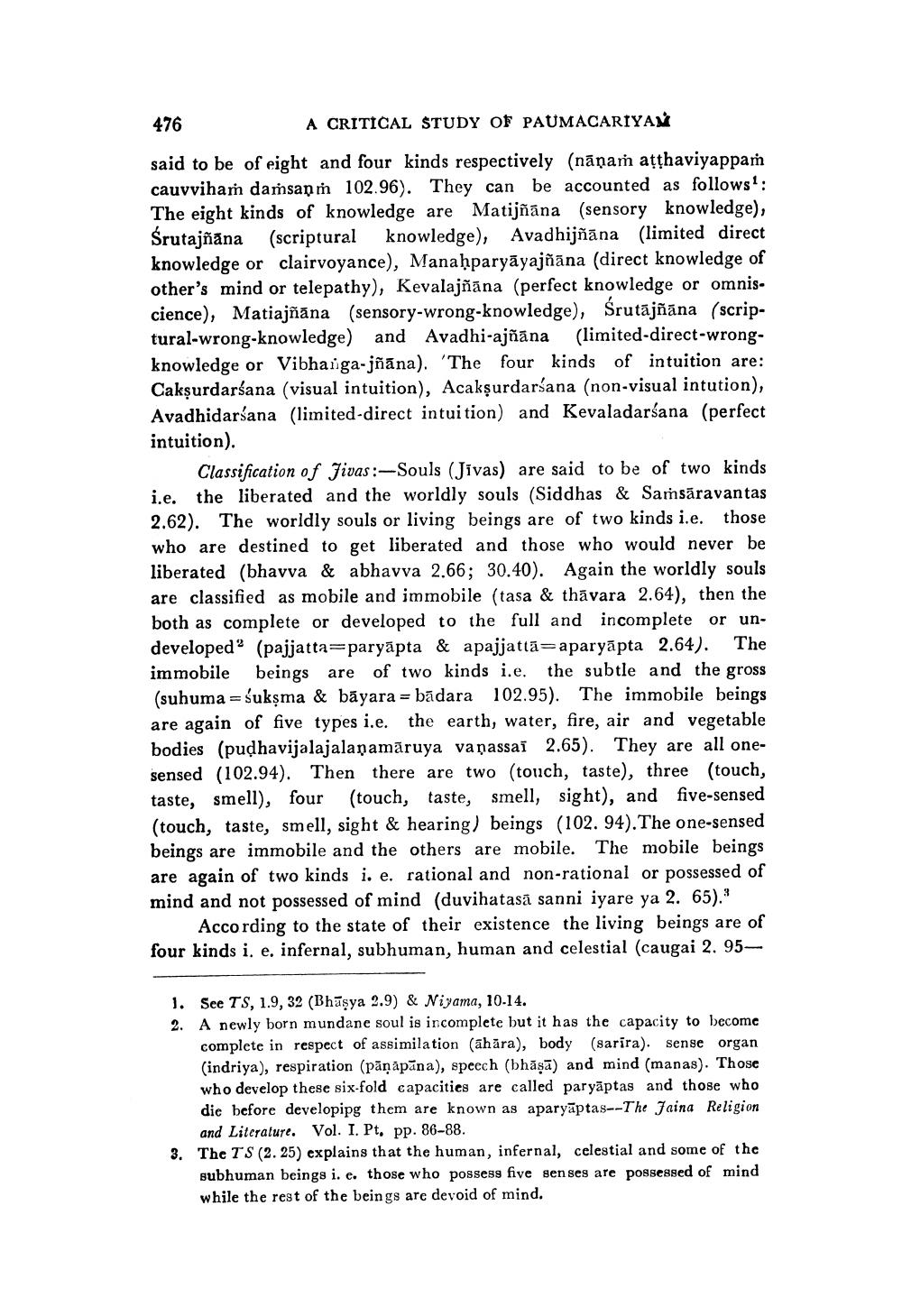________________
476
A CRITICAL STUDY OF PAUMACARIYAN
said to be of eight and four kinds respectively (nāņaṁ atthaviyappa cauvviham damsan 102.96). They can be accounted as follows: The eight kinds of knowledge are Matijñāna (sensory knowledge), Śrutajñāna (scriptural knowledge), Avadhijñāna (limited direct knowledge or clairvoyance), Manaḥparyāyajñāna (direct knowledge of other's mind or telepathy), Kevalajñāna (perfect knowledge or omnis. cience), Matiajñāna (sensory-wrong-knowledge), Srutājñāna (scriptural-wrong-knowledge) and Avadhi-ajñāna (limited-direct-wrongknowledge or Vibha iga-jñāna). 'The four kinds of intuition are: Cakşurdarśana (visual intuition), Acakşurdarśana (non-visual intution), Avadhidarśana (limited-direct intuition) and Kevaladarśana (perfect intuition).
Classification of Jivas:-Souls (Jivas) are said to be of two kinds i.e. the liberated and the worldly souls (Siddhas & Saṁsāravantas 2.62). The worldly souls or living beings are of two kinds i.e. those who are destined to get liberated and those who would never be liberated (bhavva & abhavva 2.66; 30.40). Again the worldly souls are classified as mobile and immobile (tasa & thāvara 2.64), then the both as complete or developed to the full and incomplete or undeveloped(pajjatta=paryāpta & apajjattā=aparyāpta 2.64). The immobile beings are of two kinds i.e. the subtle and the gross (suhuma=sukṣma & bāyara = bādara 102.95). The immobile beings are again of five types i.e. the earth, water, fire, air and vegetable bodies (pudhavijalajalanamāruya vaņassai 2.65). They are all onesensed (102.94). Then there are two (touch, taste), three (touch, taste, smell), four (touch, taste, smell, sight), and five-sensed (touch, taste, smell, sight & hearing) beings (102. 94). The one-sensed beings are immobile and the others are mobile. The mobile beings are again of two kinds i. e. rational and non-rational or possessed of mind and not possessed of mind (duvihatasã sanni iyare ya 2. 65)."
According to the state of their existence the living beings are of four kinds i, e. infernal, subhuman, human and celestial (caugai 2. 95
1. See TS, 1.9, 32 (Bhūşya 2.9) & Niyama, 10-14. 2. A newly born mundane soul is incomplete but it has the capacity to become
complete in respect of assimilation (ahāra), body (sarira). Sense organ (indriya), respiration (pānapāna), speech (bhāṣā) and mind (manas). Those who develop these six-fold capacities are called paryāptas and those who die before developipg them are known as aparyāptas--The Jaina Religion
and Literature. Vol. I. Pt, pp. 86-88. 3. The TS (2.25) explains that the human, infernal, celestial and some of the
subhuman beings i. e. those who possess five senses are possessed of mind while the rest of the beings are devoid of mind.




